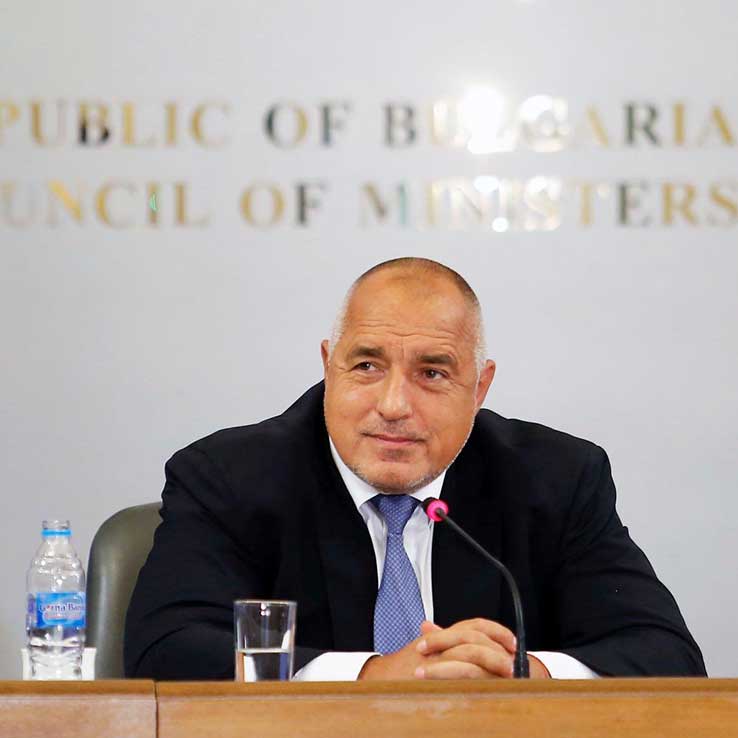Svetoslav Terziev
 It is no secret that the real enemies of Macedonia's EU membership are nationalists on both sides of the border. The current tension brings them pleasure because it justifies their existence.
It is no secret that the real enemies of Macedonia's EU membership are nationalists on both sides of the border. The current tension brings them pleasure because it justifies their existence.
Regardless of Macedonian politicians’ view of Bulgaria, they should know that Bulgaria has an impact on their future EU membership negotiations, even before negotiations have started. Macedonia, along with Albania, are the first to negotiate under the new rules introduced at France's behest. If they are wondering where that "honor" came from, they should "thank" Bulgaria and Romania.
The two countries were admitted in 2007 "as a package" including major compromise. It was known that they were not sufficiently prepared, however, they were given a chance to overcome the shortcomings in the first years of their membership, and for that purpose the Cooperation and Verification Mechanism (CVM) was introduced especially for them. It is a monitoring mechanism that monitors Bulgaria based on 6 indicators and Romania based on 4 indicators.
In general, it is about juridical reform and the fight against high-level corruption, while the fight against organized crime was added solely for Bulgaria. This mechanism was supposed to be operational for three years, but 14 years have passed and it has not been stopped yet. The problems in both countries have turned out to be so great that they seem irreparable. The European Commission is already seeking to abandon CVM, with the aim of replacing it with a common rule-of-law mechanism throughout the EU, overseen by all countries, including Bulgaria and Romania.
Macedonia should know that when membership negotiations start, other countries will not have only Macedonia in mind, but also Bulgaria, which was a bad experience for them. At the same time, it should be borne in mind that Bulgaria is not the most problematic country in the EU because much more tension is created by Poland and Hungary with their nationalism.
High-level corruption and nationalism
The Macedonian government should not give the impression that it is acting carelessly on these issues. Skopje is expected to be ready not only for legislative changes, but also to show real results in the fight against corruption - for example, with effective convictions. It is precisely what Bulgaria is lacking, because under European pressure it does amend the laws, makes structural changes in the judicial system, yet without convictions to show for it. In contrast, Romania has shown much greater real results in the fight against corruption, as it has jailed so many former ministers that would make up an entire government. On top of that, there are many convicted MPs, mayors and other senior officials.
Membership negotiations last for a number of years. During this time, the circumstances will vary and some periods may be more favorable than others. Macedonia needs to arm itself with patience (which it undoubtedly has after 15 years of waiting for the talks to start), but also to be flexible to meet new challenges. The country should not seek tensions with Bulgaria, because the negotiations principle implies that nothing is agreed until everything is agreed. This means that the closed chapters of the negotiations should not be a reason for complacency.
 Source: narodenglas.com
Source: narodenglas.com
When a country enters accession negotiations, it agrees to accept the "achievements of the Acquis Communautaire”, which contain tens of thousands of pages of regulations and directives.
Regulations apply directly and equally to all countries and take precedence over domestic law in case of inconsistencies. Directives serve as guidelines for national laws, which may differ in some countries in their wording, but have the same meaning. In addition, candidate countries should be aware of the thousands of judgments of the European Court of Justice in Luxembourg, which are the source of EU case law and show through closed cases how similar domestic or international disputes within the EU should be resolved.
All this means that a large team of specialists must be trained. Macedonia can benefit from the Bulgarian experience, as Bulgaria's main weakness at the beginning of negotiations was its lack of administrative capacity. The country negotiated more with enthusiasm than with competence. The clearest example of incompetent negotiations was the agreement to shut down four nuclear reactors (half the capacity of the Kozloduy nuclear power plant), although their design resources were not exhausted, and EU and US experts confirmed their technical viability.
In addition, their management systems were modernized at the insistence of several Western countries and were able to generate the cheapest electricity for several more years, which was also beneficial for Macedonia. Bulgaria agreed to receive tens of millions of euros from the EU for the premature shutdown of the reactors, while the losses amounted to hundreds of millions.
Another such unfortunate example was the agreement to open the internal market almost immediately after joining the EU, while some Union countries exercised their right to delay opening their labor market to Bulgaria for a maximum of 7 years. Given this disparity, many domestic production facilities were destroyed by the competition with cheaper European products, and workers who were thrown out on the street were not even allowed to seek a way out in some parts of the European labor market. These people became illegal workers who found themselves in the West because they had no choice but to become victims of brutal exploitation without the right to protection under labor laws in other countries. They entered the EU, but outside the European Social Charter.
Despite these national failures in the negotiations, Bulgaria's overall balance sheet since joining the EU is positive.
Tens of billions of euros usually stand out, funds that the country started to receive under various European programs and which make it a net user. With this money, it began to improve its road network, improve the environment, promote agricultural production and restore living conditions in settlements (for example, Sofia owes its three metro lines to EU funds). Substantial help is now expected for the "green transition" of the economy.
This is very important, but it is not key. Most importantly, the state was forced to adopt regulations that brought it closer to the more advanced EU countries and to limit the possibilities for internal arbitrariness of those in power. The supranational control system imposes restrictions on them, and monitoring how EU funds are spent is a constant warning that abuse could be detected. High hopes in the fight against corruption are placed on the European Public Prosecutor's Office, which has been under construction for several years and should start working in 2021.
Macedonia is currently very disappointed
With Bulgaria's veto on starting EU membership talks, but one should not despair. The veto will be lifted because Bulgaria itself has a great interest in Macedonia becoming an EU member. Opening EU's internal borders is the most efficient way to overcome divisive nationalism. It is no secret that the real enemies of Macedonia's EU membership are nationalists on both sides of the border. The current tension brings them pleasure because it justifies their existence.
However, in both Macedonia and Bulgaria, they are not a dominant political force and may be ousted in the next elections.
The question is how to repair the damage done. The lifting of the veto should be well motivated, for the Bulgarian state to preserve its dignity before its EU partners. It is clear that history disputes are not settled at a roundtable in the Council of Europe. All neighboring countries that are now members of the EU have had historical problems in the past. The refusal to exaggerate them is the basis on which the union is built.
However, this does not mean that Bulgaria cannot set reasonable requirements that will meet the rules for starting negotiations with the EU. All Eastern European countries had to accept the principles of the Stability Pact (Balladur Pact), when the Fifth EU Enlargement was being prepared in the 1990s. And they stipulate the regulation of interstate agreements.
The position on national minorities is especially important
The aim is not to inject these disputes into the wider European public. Bulgaria is greatly concerned over the hostile attitude towards Macedonian citizens with Bulgarian consciousness. National polls show that there are a large number of minorities in Macedonia, but no Bulgarians. Specifically, 1,417 people (0.073% of the population) identified themselves as Bulgarians, according to the census from 19 years ago, which cannot be true because in the last 10 years (from January 1, 2010 to October 22, 2020) over 70,000 citizens from Macedonia have requested a Bulgarian passport. They were issued on the basis of proof of Bulgarian descent. It can be assumed that there are other citizens with Bulgarian self-consciousness who have not applied for a Bulgarian passport.
Skopje has made the right decision to wait for the parliamentary elections in Bulgaria, which are scheduled for April 4, 2021, because it is quite possible that the nationalists will be defeated and ousted from the government. However, in order for the future Bulgarian government to make a turnaround in its attitude towards Macedonia, there will have to be a basis for that.
Here, too, Macedonia can be useful, where a census will be conducted from April 1 to 21. If efforts to cover up the Bulgarian community continue, Skopje will probably do the most damage at the worst possible moment. Bulgaria will have no choice but to point out that fact to its European partners, who are unlikely to remain neutral as they were regarding the misunderstandings about certain historical figures.
With a more pragmatic policy, Skopje will not only avoid turning Bulgaria into an obstacle for the EU, but could use its experience, which is already rich enough.
Please refer to the Terms before commenting and republishing the content.
Note: The views and opinions expressed in this article are those of the author and do not necessarily reflect the views of the Institute of Communication Studies or the donor.


